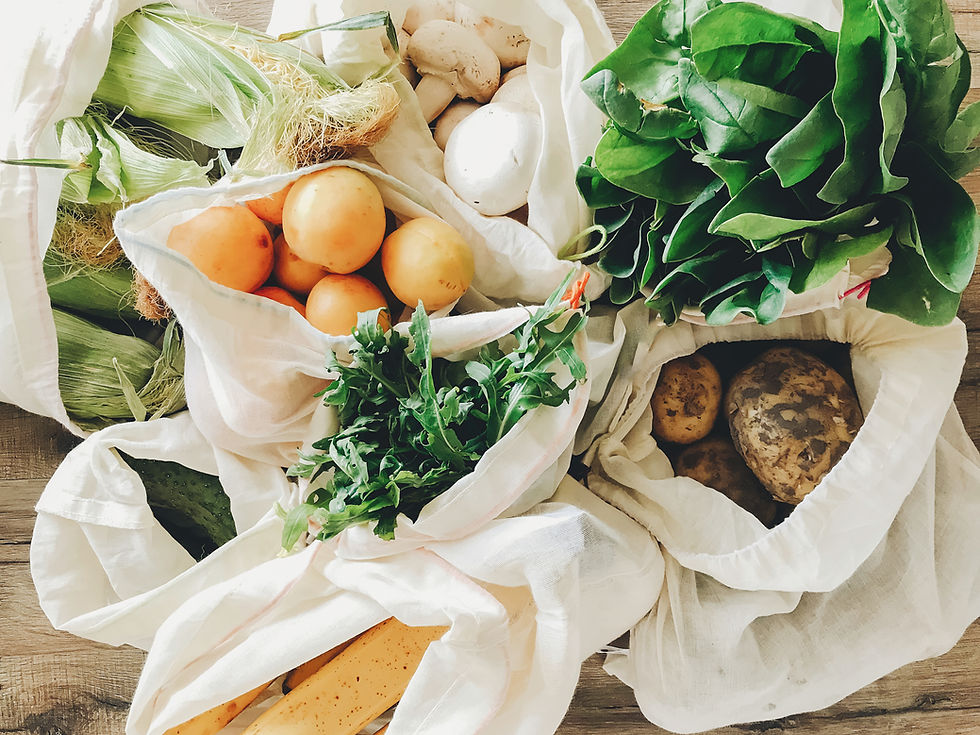5 PRACTICAL Tips for Healthy Eating On A Budget
- Allison Lê

- Jun 12, 2021
- 3 min read

How many times have you searched for a recipe and secretly whine "Oh dang, that ingredient is expensive"? I believe a lot of people have the same struggle as I do, especially for students or fresh graduates. Don't worry, there are always solutions to everything! I'll slowly walk you through the tips (and lessons) I've gathered for the past few months.

1/ Buy vegetables YOU LIKE that are in peak season
Needless to say, vegetables and fruits in season are the best! However, don't just buy them randomly. There are so many times I buy greens that I don't even enjoy eating, just because it's cheap... and they just end up at the back of my fridge until it goes bad.
Hence, list some of vegetables in season that you will enjoy eating or cooking with, look for recipes that use these ingredients for inspirations and go from there. Make yourself excited for the meals you'll be making and eating.

2/ ONLY buy the necessary amount for yourself or your family
Shop wisely. Buy enough that you'll enjoy eating and creating recipes around it. If you're unsure about the amount, either buy enough or less, not more - unless you live far away from markets or you're planning to store extra food for upcoming winter season.
In general, plan the amount of food ingredients you're going to obtain thouroughly. A lot of people will advise you to buy in bulk to save money but this doesn't work for everyone. The tip here is for you to consume ALL the ingredients you buy. No waste. Take time to plan and figure out how much is best for you or your family.

3/ Substitute. Mix and match. Be flexible.
You don't need to use the exact ingredient in your cookbook, especially if it's way out of your budget. Instead, consider using a different, cheaper ingredient that you can easily find in your local market. Pick vegetables that have the same or almost same color and texture as the written ingredient in the recipe. Don't completely eliminate it out of your dish though! The variety of different colors, textures and nutritions in your meal makes it a lot tastier. For example: you can use white bean instead of chickpea, green bean instead of asparagus, stir up butter + milk + flour instead of whipping cream for your soup (it's healthier anyway), use almond or cashew in your pesto sauce instead of pine nuts....

4/ Finish all leftovers before the next grocery shopping
Find ways to enjoy your leftovers - either it's leftover meals from the night before, or the last half bell pepper that you didn't use up yesterday. Make sure you empty all ingredients in your fridge before the next grocery haul, otherwise you'll be too excited to use newer, fresher ingredients and completely forget about the remaining ones at the back of your fridge.
Some ideas to use leftovers: make lettuce or tortilla wraps, add in salad as toppings, mix it with rice + some of your favorite sauce to make a bibimbap bowl, use whatever's left to make a colorful budha bowl...

5/ Buy good condiments
Last but undoubtedly not least tip for you to have delicious meals everyday. I know having a variety of good condiments in your pantry may sound expensive to begin with, but in fact, they last for a quite long time and they make such simple ingredients become so fragrant and tasty. So don't hesitate to get a good bottle of olive oil, or some spices, herbs and aromatics, your favorite sauces... My two cents: - Use monounsaturated (more expensive) oil like avocado, grapeseed, olive oil for salad dressings and polyunsaturated oil (cheaper) like sunflower, corn or soybean oil... in other stir fry or deep frying recipes. - As for spices and aromatics: if you're not familiar with mixing spices together on your own, opt for mixed bottles like cajun seasoning, italian spices, pickling spices...; only buy garlic and onion powder seperately because these are more commonly and easily used in a lot of recipes.
- Elements widely used in toppings/decorations as sour cream, cheese, nuts, raisins,... try your best to purchase quality condiments, a little goes a long way - you don't need to buy a lot, but these ingredients can really elevate your meals.
I hope you find these tips somewhat useful. If you have any other struggles or experiences you'd like to discuss, please feel free to comment below.

Comments